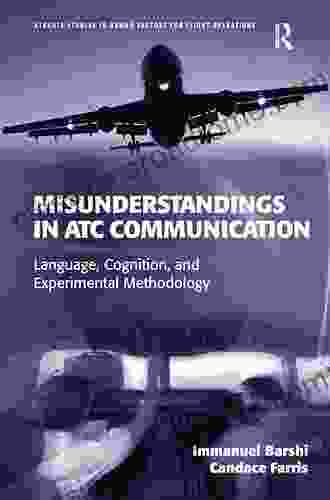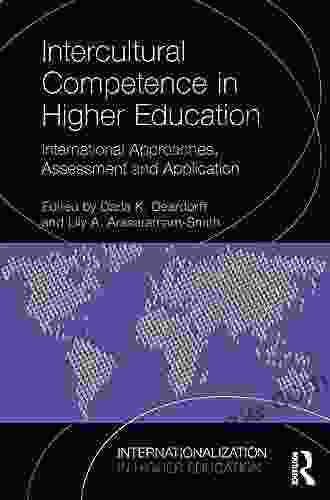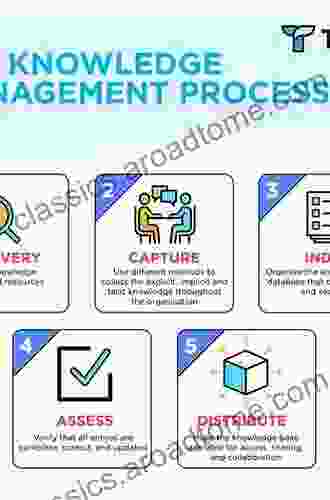Intercultural Competence In Higher Education: A Key to Success

What is Intercultural Competence?
Intercultural competence is the ability to effectively communicate, collaborate, and problem-solve with people from different cultural backgrounds.
5 out of 5
| Language | : | English |
| File size | : | 4674 KB |
| Text-to-Speech | : | Enabled |
| Screen Reader | : | Supported |
| Enhanced typesetting | : | Enabled |
| Print length | : | 328 pages |
It involves:
- Understanding and respecting cultural differences
- Being able to communicate effectively with people from different cultures
- Being able to work collaboratively with people from different cultures
- Being able to resolve conflicts peacefully and respectfully
Why is Intercultural Competence Important in Higher Education?
Intercultural competence is increasingly important in higher education for several reasons.
- The world is becoming increasingly globalized. Students are more likely to encounter people from different cultures in their personal and professional lives.
- Higher education is becoming more diverse. The number of international students and faculty on college campuses is growing.
- Employers are looking for employees who are interculturally competent. Employees who can work effectively with people from different cultures are more likely to be successful in today's global workplace.
The Challenges of Developing Intercultural Competence
Developing intercultural competence is a challenging but rewarding process.
Some of the challenges include:
- Cultural biases and stereotypes. We all have biases and stereotypes about other cultures. These can make it difficult to understand and respect people from different cultures.
- Language barriers. Language can be a barrier to communication and understanding. This can make it difficult to build relationships and collaborate with people from different cultures.
- Culture shock. When we encounter a new culture, we may experience culture shock. This can make it difficult to adjust to the new culture and interact with people from that culture.
How to Enhance Intercultural Competence
There are several things we can do to enhance our intercultural competence.
- Be open-minded and curious about other cultures. The first step to developing intercultural competence is to be open-minded and curious about other cultures. This means being willing to learn about new cultures and to challenge our own assumptions about them.
- Spend time with people from different cultures. One of the best ways to develop intercultural competence is to spend time with people from different cultures. This could involve studying abroad, volunteering in a diverse community, or simply making friends with people from different cultures.
- Learn about different cultures. There are many ways to learn about different cultures, such as reading books, watching movies, and listening to music. Taking a course on intercultural communication can also be helpful.
- Develop a critical understanding of your own culture. It is important to develop a critical understanding of your own culture in Free Download to understand and appreciate other cultures. This means being aware of your own biases and stereotypes and being willing to challenge them.
Intercultural competence is a key to success in higher education and beyond.
By developing our intercultural competence, we can build bridges between cultures, promote understanding, and create a more just and equitable world.
Learn more about intercultural competence in the book "Intercultural Competence in Higher Education" by Laura L. Finley and Susan D. Blum.
5 out of 5
| Language | : | English |
| File size | : | 4674 KB |
| Text-to-Speech | : | Enabled |
| Screen Reader | : | Supported |
| Enhanced typesetting | : | Enabled |
| Print length | : | 328 pages |
Do you want to contribute by writing guest posts on this blog?
Please contact us and send us a resume of previous articles that you have written.
 Book
Book Novel
Novel Page
Page Chapter
Chapter Text
Text Story
Story Genre
Genre Reader
Reader Library
Library Paperback
Paperback E-book
E-book Magazine
Magazine Newspaper
Newspaper Paragraph
Paragraph Sentence
Sentence Bookmark
Bookmark Shelf
Shelf Glossary
Glossary Bibliography
Bibliography Foreword
Foreword Preface
Preface Synopsis
Synopsis Annotation
Annotation Footnote
Footnote Manuscript
Manuscript Scroll
Scroll Codex
Codex Tome
Tome Bestseller
Bestseller Classics
Classics Library card
Library card Narrative
Narrative Biography
Biography Autobiography
Autobiography Memoir
Memoir Reference
Reference Encyclopedia
Encyclopedia Paul Fenton Smith
Paul Fenton Smith Jack Schaefer
Jack Schaefer Andy Crouch
Andy Crouch Andrea Dallan
Andrea Dallan Wes Jackson
Wes Jackson Gwen Lawrence
Gwen Lawrence Andrew P C
Andrew P C John Dinges
John Dinges Himalaya Sarmah
Himalaya Sarmah Cory Graff
Cory Graff Anita Anne Lambert
Anita Anne Lambert M Joseph Sirgy
M Joseph Sirgy Amy Van Atta Slater
Amy Van Atta Slater T Lobsang Rampa
T Lobsang Rampa Anirban Bandyopadhyay
Anirban Bandyopadhyay Cindy I Fen Cheng
Cindy I Fen Cheng Jeanette Winter
Jeanette Winter Ana Claudia Domene
Ana Claudia Domene Tevia Feng
Tevia Feng Ian Hall
Ian Hall
Light bulbAdvertise smarter! Our strategic ad space ensures maximum exposure. Reserve your spot today!
 Tennessee WilliamsFollow ·15k
Tennessee WilliamsFollow ·15k Casey BellFollow ·6.5k
Casey BellFollow ·6.5k Elmer PowellFollow ·3.9k
Elmer PowellFollow ·3.9k Howard BlairFollow ·3.3k
Howard BlairFollow ·3.3k Edgar CoxFollow ·10.3k
Edgar CoxFollow ·10.3k Bradley DixonFollow ·7.8k
Bradley DixonFollow ·7.8k Steven HayesFollow ·15.5k
Steven HayesFollow ·15.5k Guillermo BlairFollow ·9.3k
Guillermo BlairFollow ·9.3k

 Braden Ward
Braden WardThe True Story of Murder and Betrayal
In a small town where...

 W. Somerset Maugham
W. Somerset MaughamUnraveling the Complexities of Human Language: A...
Language is a fundamental aspect of human...

 Ibrahim Blair
Ibrahim BlairTrue Crime Tales That Will Keep You on the Edge of Your...
Prepare to be...

 Rick Nelson
Rick NelsonPatterns In Rhyme: A Journey of Discovery with Patrick...
Welcome to the...

 Edgar Hayes
Edgar HayesWithout Pity: Unmasking the Evil Within
In the realm of true...

 Cooper Bell
Cooper BellFannie Lou Hamer's Indelible Legacy: Unraveling the...
The Black Freedom Movement, a pivotal...
5 out of 5
| Language | : | English |
| File size | : | 4674 KB |
| Text-to-Speech | : | Enabled |
| Screen Reader | : | Supported |
| Enhanced typesetting | : | Enabled |
| Print length | : | 328 pages |












